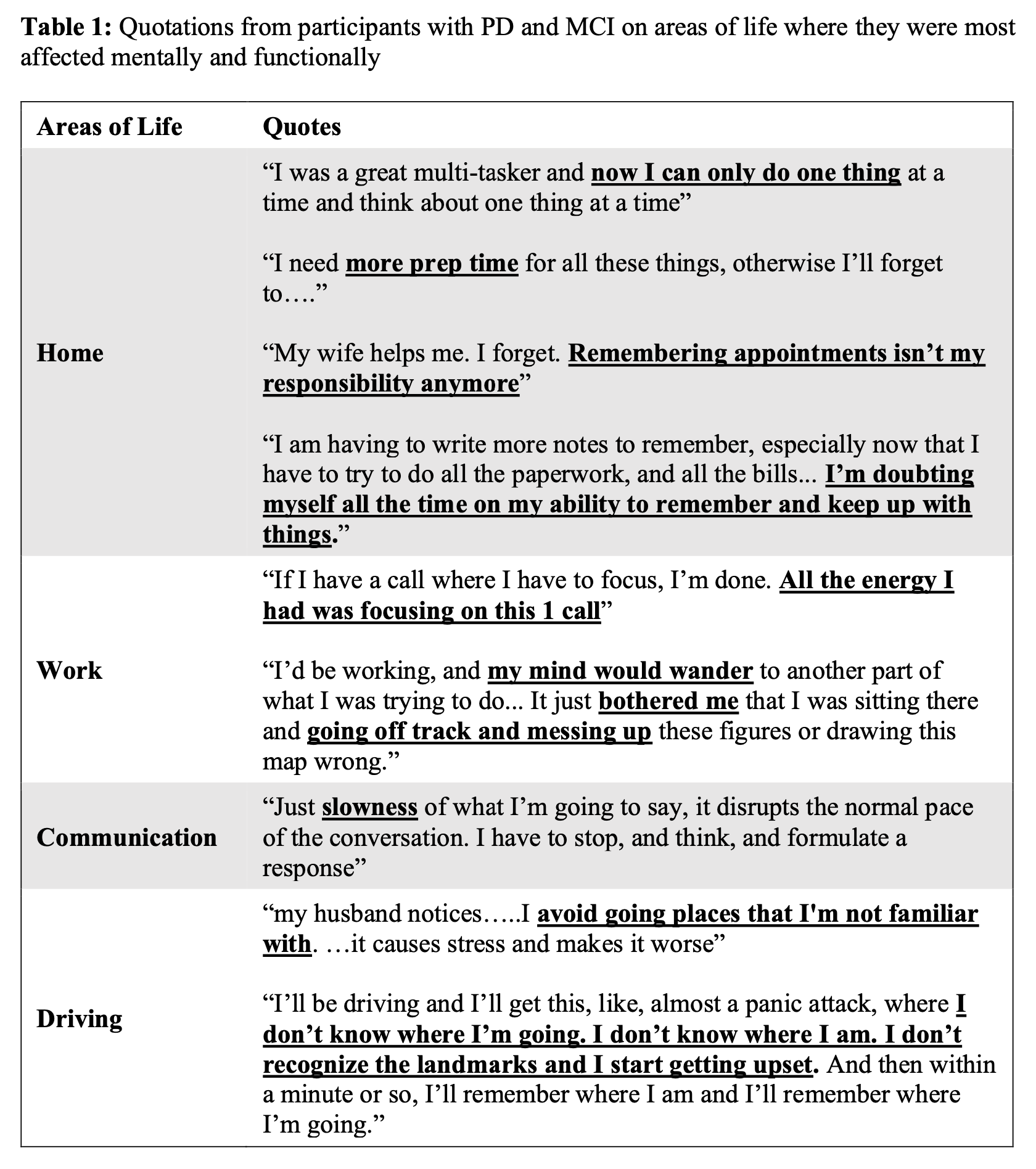Category: Parkinson's Disease: Non-Motor Symptoms
Objective: To understand the experience of mild cognitive impairment (MCI) in people with Parkinson’s disease (PwP) and its impact on daily life.
Background: Parkinson’s disease (PD) is often associated with motor symptoms, however, ~40% of PwP experience MCI [1]. Qualitative research involving PwP experiencing MCI may inform our understanding of these symptoms and their impacts.
Method: Qualitative interviews were conducted over telephone with 28 adults diagnosed with mild-to-moderate PD in the US, who self-reported changes in their cognitive functioning. Participants were asked to share their daily experiences related to cognitive functioning to identify concepts (symptoms and impacts) associated with MCI. Two patient-reported outcome measures (PROMs), Penn Parkinson’s Daily Activities Questionnaire-15 (PDAQ-15) and Quality of Life in Neurological Disorders-Cognitive Functioning Subscale (NeuroQOL-CF), were then debriefed to understand the relevance of concepts measured and identify new concepts that were not addressed. Qualitative analysis methods were used to summarize responses.
Results: Of 28 participants, the mean age was 64.7 years, 50.0% were female, 82.1% were White, mean PD diagnosis duration was 8.8 years, and 78.6% discussed MCI with their physician. Three participants were excluded from qualitative analyses due to a likely more advanced stage of cognitive impairment; of 25 remaining participants, the most reported problems were with memory (96.0%), processing (72.0%), and concentration (68.0%). Specifically, problems with memory (76.0%) and processing (60.0%) impacted participants’ ability to complete daily activities. Participants were frustrated by the detailed planning, increased time required to complete daily activities and decreased multitasking ability [table 1]. During cognitive debriefing of both PROMs (39 unique items), only 4 NeuroQOL items (ie, difficulty with task initiation, word recall, processing speed and memory) were fully endorsed (ie, all participants reported difficulties in the past 7 days).
Conclusion: Most participants experienced cognitive symptoms that negatively impacted daily functioning and independence. Although current PROMs in PD include some concepts relevant to patients, further research is needed to better assess MCI in PwP, including the time, preparation and deliberation required for successful completion of daily activities.
References: [1] Baiano C, Barone, P, Trojano L, Santangelo, G. Prevalence and Clinical Aspects of Mild Cognitive Impairment in Parkinson’s Disease: A Meta-Analysis. Movement Disorders. 2019 Nov 19; 35(1) 45-54.
To cite this abstract in AMA style:
J. Petrillo, TM. Brown, K. Paumier, J. Dine, R. Sawant, S. Baradaran, A. Koenig. The impact of mild cognitive impairment on functioning in people with Parkinson’s disease [abstract]. Mov Disord. 2023; 38 (suppl 1). https://www.mdsabstracts.org/abstract/the-impact-of-mild-cognitive-impairment-on-functioning-in-people-with-parkinsons-disease/. Accessed April 20, 2025.« Back to 2023 International Congress
MDS Abstracts - https://www.mdsabstracts.org/abstract/the-impact-of-mild-cognitive-impairment-on-functioning-in-people-with-parkinsons-disease/

